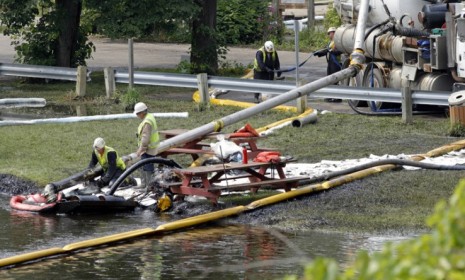The Keystone XL pipeline: Would a catastrophic oil spill be inevitable?
A new study argues that the damage from spills would likely destroy more jobs than the controversial pipeline could ever create

A free daily email with the biggest news stories of the day – and the best features from TheWeek.com
You are now subscribed
Your newsletter sign-up was successful
President Obama's controversial rejection of the proposed Keystone XL oil pipeline from Canada to refineries on the Gulf Coast promises to be a contentious issue in this year's presidential election, as Republicans accuse Obama of killing a project that would have created 20,000 badly needed jobs. But a new study by Cornell University's Global Labor Institute is bolstering the position of the pipeline's environmentalist opponents, suggesting that the potential job gains might not be worth the considerable risk of a catastrophic spill. Here's what you should know:
What exactly does the study say?
"The history of other pipelines indicates that spills from [Keystone XL] are inevitable," say the authors of the Cornell study, For instance, the Keystone I pipeline, which started carrying Canadian tar-sands crude 2,100 miles from Alberta to Illinois in 2010, experienced more than 30 spills — including 14 leaks on U.S. soil — in just its first year of operation. The authors say such historical data means a major spill for Keystone XL is almost a statistical certainty if the pipeline is operated for 50 years.
The Week
Escape your echo chamber. Get the facts behind the news, plus analysis from multiple perspectives.

Sign up for The Week's Free Newsletters
From our morning news briefing to a weekly Good News Newsletter, get the best of The Week delivered directly to your inbox.
From our morning news briefing to a weekly Good News Newsletter, get the best of The Week delivered directly to your inbox.
What makes spills so likely?
Canada's tar-sands crude, known in the industry as diluted bitumen, is more prone to spills than conventional crude. Between 2007 and 2010, the stuff poured out of pipelines in the northern Midwest three times as often as conventional oil, possibly "because the heavy, corrosive material puts greater stress on pipelines," says Alyssa Battistoni at Salon. The same properties make it harder to clean up than regular crude, increasing the risk of environmental damage, according to the study.
How bad would these spills be?
That's the big question. A July 2010 accident dumped hundreds of thousands of gallons of tar sands oil into Michigan's Kalamazoo River, and has proven a nightmare to clean up. Already the effort has cost $725 million, caused scores of health problems, and left the river closed to fishing. The Keystone XL pipeline, which would cross hundreds of bodies of water, could suffer the same kind of spill, says Sean Sweeney, the Cornell institute's director and a co-author of the study. TransCanada, the company seeking to build the pipeline, disputes such assessments.
A free daily email with the biggest news stories of the day – and the best features from TheWeek.com
So... what does this prove?
According to the study, the pipeline would destroy more jobs than it creates. The study says only 20 permanent jobs would be created in the six states the pipeline would cross — not 20,000, as others claim — and that spills in areas dependent on agriculture and tourism would wash away a lot more than 20 jobs.
Is everyone convinced?
No way, says Dale Lunan at Oil Week. Pipelines are still our best bet. The world needs that oil, and until Keystone XL gets built oil will be transported across the U.S. by train. "I shudder to think of the mess that will be left behind the first time one of these 100-car crude unit trains runs off the tracks. And to borrow an oft-used phrase from the Green Grinches: It's not a question of if, it's a question of when."
Sources: Global Labor Institute, NY Times, Oil Week, Salon
-
 The UK expands its Hong Kong visa scheme
The UK expands its Hong Kong visa schemeThe Explainer Around 26,000 additional arrivals expected in the UK as government widens eligibility in response to crackdown on rights in former colony
-
 One great cookbook: Joshua McFadden’s ‘Six Seasons of Pasta’
One great cookbook: Joshua McFadden’s ‘Six Seasons of Pasta’the week recommends The pasta you know and love. But ever so much better.
-
 Scientists are worried about amoebas
Scientists are worried about amoebasUnder the radar Small and very mighty